To view a PDF of slides presented during PRRI’s February 28, 2024, webinar on the report, please click here. For a replay of the PRRI webinar via YouTube, please click here.
Executive Summary
Throughout 2023, PRRI interviewed more than 22,000 adults as part of its American Values Atlas, which provides for the first time the ability to estimate support for Christian nationalism in all 50 states. Additionally, this new analysis examines how religion, party, education, race, and other factors intersect with Christian nationalist views.
Roughly three in ten Americans qualify as Christian nationalism Adherents or Sympathizers.
- Three in ten Americans qualify as Christian nationalism Adherents (10%) or Sympathizers (20%), compared with two-thirds who qualify as Skeptics (37%) or Rejecters (30%).
- These percentages have remained stable since PRRI first asked these questions in late 2022.
Residents of red states are significantly more likely than those in blue states to hold Christian nationalist beliefs.
- On the map, states with the highest levels of support for Christian nationalism form a horseshoe shape, starting in the upper Midwest, dipping down into the deep South, and then moving up again through the Appalachian Mountains. There are five states in which more than 45% of residents are Christian nationalism Adherents or Sympathizers: North Dakota (50%), Mississippi (50%), Alabama (47%), West Virginia (47%), and Louisiana (46%).
- Nearly four in ten residents of red states are Christian nationalists (14% Adherents and 24% Sympathizers); this is nearly twice the proportion of blue state residents who are Christian nationalists (6% Adherents and 16% Sympathizers). Residents of seven battleground states look nearly identical to the national average: 10% are Christian nationalism Adherents and 19% are Sympathizers.
- At the state level, support for Christian nationalism is strongly correlated with voting for former President Donald Trump in the 2020 election. Overall, as the proportion of Christian nationalists in a state increases, the percentage of residents who voted for Trump in 2020 also increases. If the analysis is restricted to white Americans only, the relationship between state-level support for Christian nationalism and votes for Trump in 2020 becomes even stronger.
At the national level, Christian nationalism is strongly linked to Republican party affiliation and holding favorable views of Trump.
- Republicans (55%) are more than twice as likely as independents (25%) and three times as likely as Democrats (16%) to hold Christian nationalist views.
- Among those who hold favorable views of Trump, 55% qualify as Christian nationalists (21% Adherents and 34% Sympathizers). Only 15% of those who hold favorable views of President Joe Biden qualify as Christian nationalists (4% Adherents and 11% Sympathizers).
Christian nationalism is strongly linked to evangelical/born-again identity and frequent church attendance.
- Majorities of two religious groups hold Christian nationalist beliefs: white evangelical Protestants (66%) and Hispanic Protestants (55%), a group among whom seven in ten also identify as evangelical or born-again. Less than four in ten of all other major religious groups qualify as Christian nationalists.
- Christian nationalists are more likely than those who reject those views to hold theological beliefs that are markers of some charismatic strands of Christianity: beliefs about modern-day prophecy, spiritual healing, and the prosperity gospel.
- Among Americans who attend religious services weekly or more, a majority (52%) are Christian nationalist Adherents or Sympathizers, compared with 38% of those who attend a few times a year and 18% of those who seldom or never attend.
Christian nationalists are more likely than other Americans to see political struggles through the apocalyptic lens of revolution and to support political violence.
- A majority of Christian nationalism Adherents (54%) and 45% of Sympathizers agree that “there is a storm coming soon that will sweep away the elites in power and restore the rightful leaders,” compared with only 22% of Skeptics and 7% of Rejecters.
- Christian nationalists are about twice as likely as other Americans to believe political violence may be justified. Nearly four in ten Christian nationalism Adherents (38%) and one-third of Sympathizers (33%) agree that “because things have gotten so far off track, true American patriots may have to resort to violence to save the country,” compared with only 17% of Skeptics and 7% of Rejecters.
While there is little variation in support for Christian nationalist beliefs by race or ethnicity alone, Christian nationalist beliefs are refracted through racial and ethnic identity, which produces divergent political outcomes among white, Hispanic, and Black Americans.
- Among white Americans and Hispanic Americans — but not Black Americans — holding Christian nationalist beliefs is strongly correlated with Republican Party identity and support for Trump.
- Black Americans who hold Christian nationalist beliefs are not significantly more likely than Black Americans overall to identify as Republican (8% vs. 5%).
- Black Christian nationalists are only slightly more likely than Black Americans overall to hold favorable views of Trump (21% vs. 14%).
- White Christian nationalists are far more likely than Hispanic and Black Christian nationalists to prioritize the issues of immigration and access to guns when they think about supporting a political candidate.
- White Christian nationalists are far more likely than Hispanic or Black Christian nationalists to say they most trust Fox News or far-right television news sources to give them accurate information about current events and politics.
Introduction
In partnership with the Brookings Institution, PRRI released a major national survey in February 2023 that provided new, comprehensive measures to estimate the proportion of Americans who support or reject Christian nationalist ideology. Building on that work, PRRI interviewed more than 22,000 adults throughout 2023 as part of its American Values Atlas, the largest dataset ever assembled on this topic, which provides for the first time the ability to calculate support for Christian nationalism in all 50 states. In addition to showing Christian nationalism’s prevalence across the United States, this new data examines how religion, party, education, race, and other factors intersect with Christian nationalist views. Because the data was collected in four waves across 2023, it also shows trends regarding how these views have shifted over the last year.
Measuring Christian Nationalism
To measure Christian nationalism, PRRI used a battery of five questions about the relationship between Christianity, American identity, and the U.S. government. The questions were first developed for the PRRI/Brookings Christian Nationalism Survey, which was based on data collected in late 2022 and released in a major report in February 2023 (See Appendix A for full methodology). PRRI included these five questions in four follow-up surveys throughout 2023, which were each conducted among a representative sample of more than 5,000 Americans. Respondents in our American Values Atlas were asked whether they completely agree, mostly agree, mostly disagree, or completely disagree with each of the following statements:
- The U.S. government should declare America a Christian nation.
- U.S. laws should be based on Christian values.
- If the U.S. moves away from our Christian foundations, we will not have a country anymore.
- Being Christian is an important part of being truly American.
- God has called Christians to exercise dominion over all areas of American society.
Based on their answers to these five questions, each respondent receives a composite score on the Christian nationalism scale (with a range of zero to one) and is then assigned to one of four groups:
Christian Nationalism Adherents (Score 0.75–1): These Americans overwhelmingly either agree or completely agree with all five statements in the scale. This group includes 10% of Americans.
Christian Nationalism Sympathizers (Score 0.5–0.74): These Americans agree with most statements in the scale, but they are less likely than Adherents to completely agree. This group includes 20% of Americans.
Christian Nationalism Skeptics (Score 0.01-0.49): These Americans disagree with most statements in the scale, but they are less likely than Rejecters to completely disagree. This group includes 37% of Americans.
Christian Nationalism Rejecters (Score 0): These Americans completely disagree with all five statements in the scale. This group includes 30% of Americans.
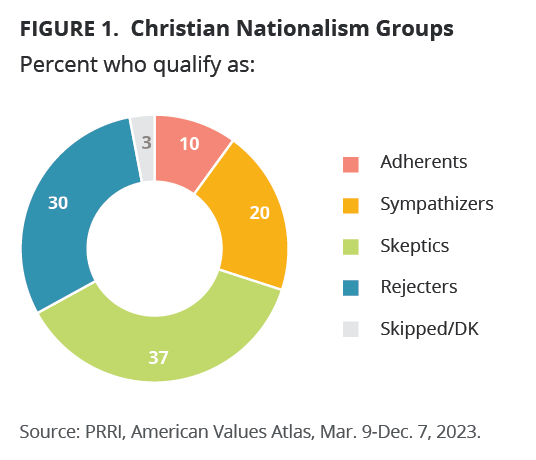
As the chart below demonstrates, attitudes about Christian nationalism have remained stable throughout 2023.
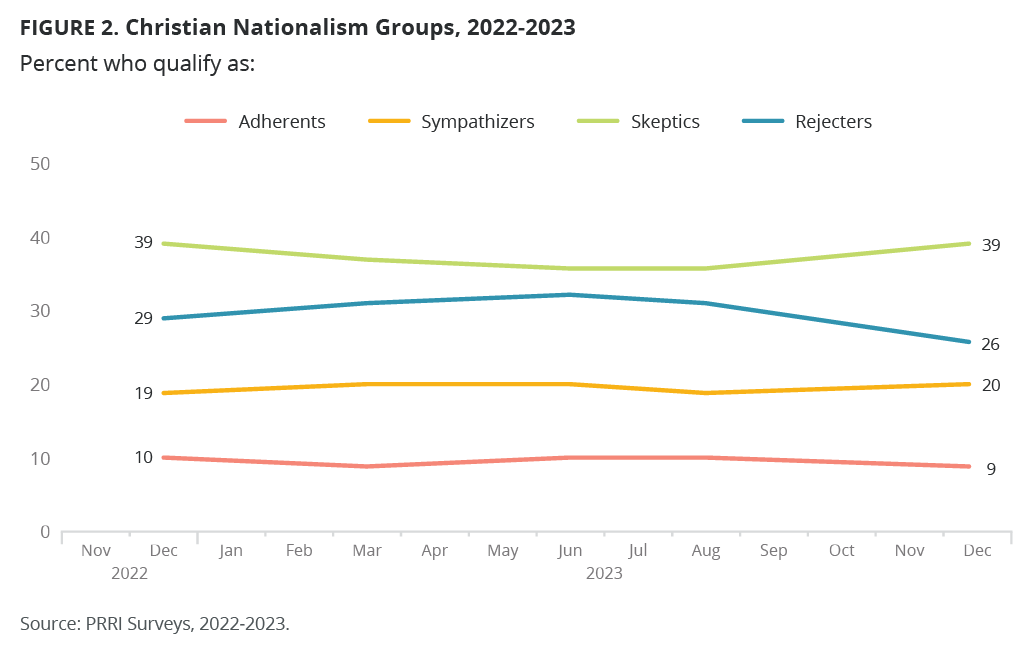
Christian Nationalism at the State Level
Patterns of Support for Christian Nationalism Across All 50 States
The proportion of Americans who support Christian nationalist ideology, defined in this report as Christian nationalism Adherents and Sympathizers, differs considerably across states, ranging from a low of 17% to a high of 50% (See Appendix B for a table of Christian nationalism groups in all 50 states).
When viewed as a heat map, the states with the highest levels of support for Christian nationalism form a horseshoe shape, starting in the upper Midwest, dipping down into the deep South, and then moving up again through the Appalachian Mountains. Americans who hold Christian nationalist beliefs are most likely to live in these regions, including five states in which more than 45% of residents are Christian nationalism Adherents or Sympathizers: North Dakota (50%), Mississippi (50%), Alabama (47%), West Virginia (47%), and Louisiana (46%). At the other end of the spectrum, there are seven states in which 20% or fewer residents hold Christian nationalist views, which are in the West and Northeast: Washington (20%), Oregon (17%), and Nevada (20%), along with New Jersey (20%), New York (19%), Maryland (19%), and Massachusetts (18%).
This horseshoe pattern of Christian nationalist concentrations emerges in even sharper relief when the analysis is limited to white, non-Hispanic Americans. In three states, at least half of white residents qualify as Christian nationalism Adherents or Sympathizers: Mississippi (52%), Nebraska (52%), and North Dakota (50%). In an additional five states, more than 45% of white residents are Christian nationalism Adherents or Sympathizers, including Arkansas (49%), West Virginia (49%), Louisiana (46%), Alabama (46%), and Kentucky (46%).[1]
Red States, Blue States, Battleground States, and Christian Nationalism
Support for Christian nationalism in each state is strongly correlated with the state’s partisan tilt in recent presidential elections. If we sort states into safe Republican states, safe Democratic states, and the seven states considered to be battlegrounds in the 2024 presidential election, we see a remarkably clear pattern emerge (see Appendix B for a table containing the breakdown of Christian nationalism groups for all 50 states, coded by partisan tilt).
New Mexico (32%) is the only blue state in which support for Christian nationalism (Adherents and Sympathizers) falls above the national average (30%); Utah (28%) is the only red state in which support for Christian nationalism falls below the national average. The battleground states are scattered across the middle of the distribution, with the two southern battleground states, North Carolina (36%) and Georgia (33%), falling just above the national average of support for Christian nationalism. Pennsylvania (29%) falls right at the national average, while support for Christian nationalism among the rest of the battleground states falls below the national average: Arizona (27%), Michigan (26%), Wisconsin (25%), and Nevada (20%).
Taken together, nearly four in ten residents of red states are Christian nationalism Adherents (14%) or Sympathizers (24%), nearly twice the proportion of blue state residents who are Christian nationalism Adherents (6%) or Sympathizers (16%). Residents of the seven battleground states look nearly identical to the national average: 10% are Christian nationalism Adherents and 19% are Sympathizers.
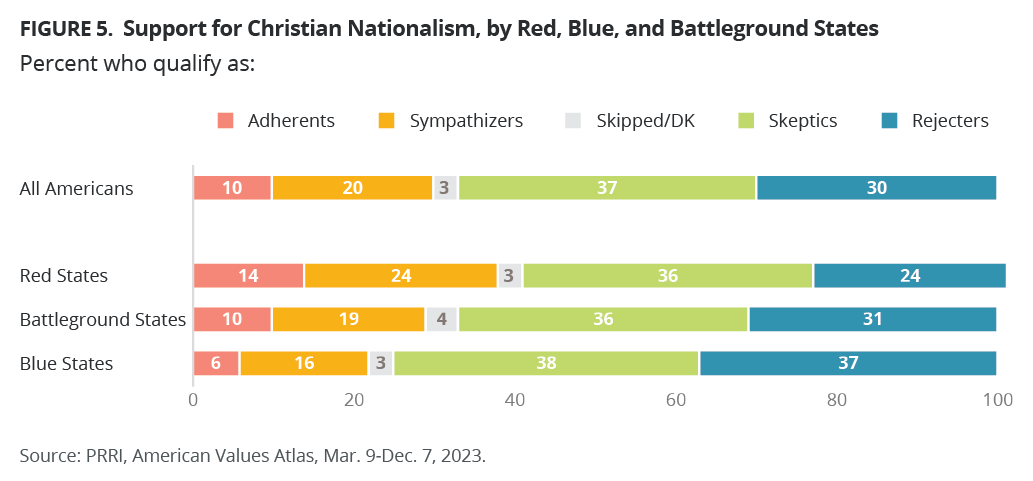
Christian Nationalism and Support for Donald Trump by State in 2020
Support for Christian nationalism is also positively correlated with presidential vote choice in the 2020 election. The scatter plot below shows the relationship between a state’s average raw score on the Christian nationalism scale (with a range from zero to one) on the X axis, plotted against the percentage of that state’s vote for former President Donald Trump in the 2020 election. The upward sloping trend line through the distribution demonstrates that, overall, the higher state residents scored on the Christian nationalism scale, the more likely they were to support Trump.
For example, Mississippi has an average score of 0.48 on the Christian nationalism scale, and 58% of Mississippi voters cast their ballots for Trump in 2020. Similarly, West Virginia has an average score of 0.46 on the Christian nationalism scale and 68% of that state’s voters cast their ballots for Trump. At the other end of the scale, Washington has an average Christian nationalism score of 0.22 and 39% of its voters supported Trump in the 2020 election. Similarly, Massachusetts has an average score of 0.23 on the Christian nationalism scale, and only 32% of Massachusetts voters supported Trump.[2]
If the analysis is restricted to white Americans, the relationship between holding Christian nationalist views and voting for Trump is even stronger. To use the same state examples as above, white Mississippians have an average score of 0.51 on the Christian nationalism scale, and 81% of white Mississippi voters cast their ballots for Trump in 2020. Similarly, white West Virginians have an average score of 0.47 on the Christian nationalism scale and 71% of that state’s voters cast their ballots for Trump. At the other end of the scale, white Washingtonians have an average Christian nationalism score of 0.21 and 40% of its white voters supported Trump in the 2020 election. Similarly, white Massachusetts residents have an average score of 0.21 on the Christian nationalism scale, and only 35% of white Massachusetts voters supported Trump.[3]
Which Political and Demographic Groups are Most Likely to Support Christian Nationalism?
Partisanship and Presidential Candidate Support
Partisanship is closely linked to Christian nationalist views. A majority of Republicans (55%) qualify as Christian nationalists (21% Adherents and 34% Sympathizers). Republicans are more than twice as likely as independents (25%) and three times as likely as Democrats (16%) to hold Christian nationalist views. Conversely, Republicans (43%) are much less likely than independents (73%) or Democrats (83%) to qualify as Christian nationalism Skeptics or Rejecters. There have been no significant changes in support for Christian nationalism by party affiliation over the last year.
The link between partisanship and Christian nationalism can also be seen through the lens of support for the two likely 2024 presidential candidates. Among those who hold favorable views of Trump, 55% qualify as Christian nationalists (21% Adherents and 34% Sympathizers). By contrast, only 15% of those who hold favorable views of President Joe Biden qualify as Christian nationalist (4% Adherents and 11% Sympathizers).
Among white Americans who hold favorable views of Trump, 57% are Christian nationalists (22% Adherents and 35% Sympathizers). By contrast, among white Americans who hold a favorable view of Biden, only 9% are Christian nationalists (2% Adherents and 7% Sympathizers).
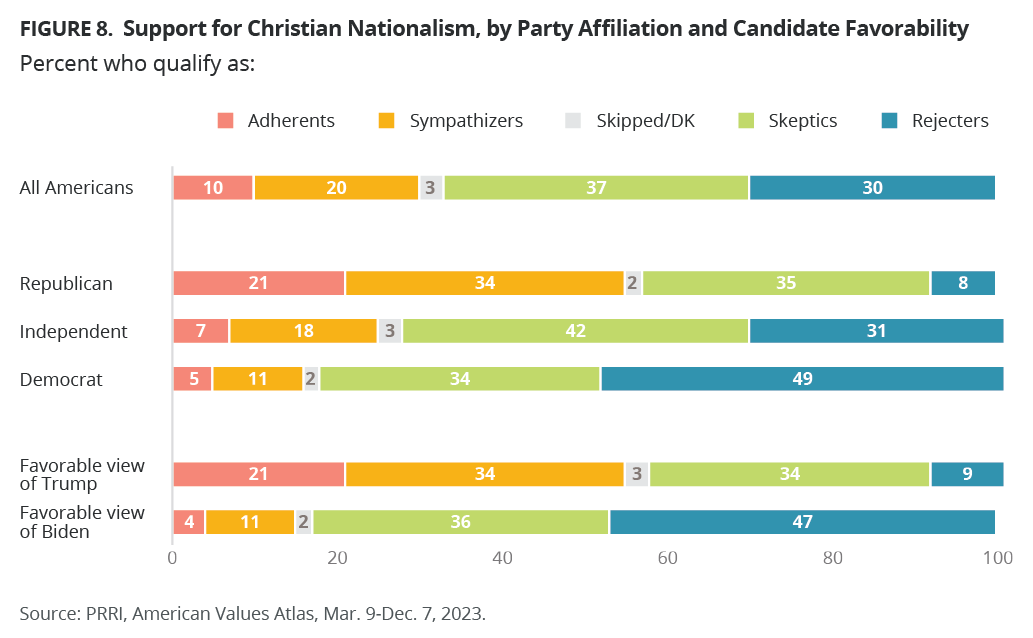
These correlations are also evident when the analysis is conducted in the opposite direction. More than six in ten Christian nationalism Adherents and Sympathizers (61%) have a favorable view of Trump, compared with only 22% who have a favorable view of Biden.
Trust in Television Media Sources
Support for Christian nationalism is also strongly correlated with trust in television news sources. Two-thirds of Americans who most trust far-right news sources such as One America News Network and Newsmax (67%) and a majority of those who most trust Fox News (55%) qualify as Christian nationalism Adherents or Sympathizers. By contrast, around one-fourth of Americans who do not watch any TV news source (28%) and who trust mainstream news (22%) qualify as Christian nationalism Adherents or Sympathizers; the vast majority of these latter groups qualify as Christian nationalism Skeptics or Rejecters (69% and 75%, respectively).[4]
With one exception, the relationship between trusted media outlets and support for Christian nationalism has remained stable over the last year. Among those who most trust far-right news sources, the proportion who qualify as Christian nationalism Adherents or Sympathizers dropped from 79% in 2022 to 67% in 2023.
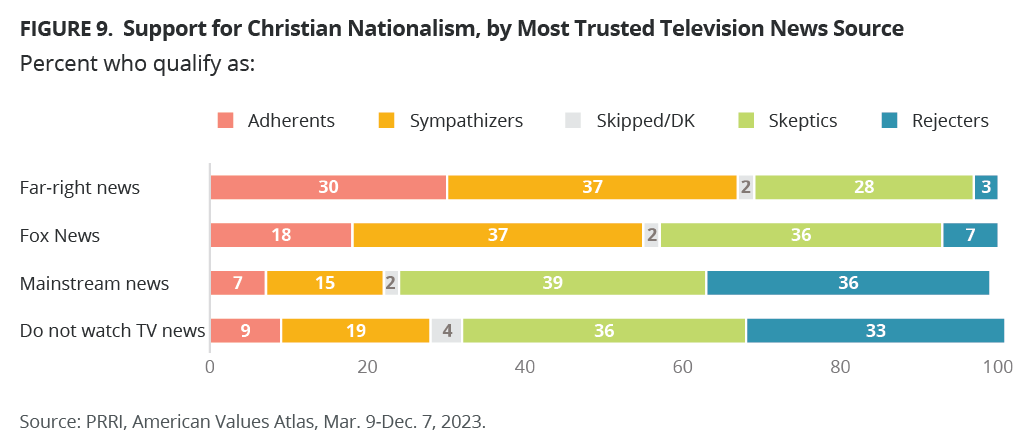
Gender, Age, and Educational Attainment
There are no significant differences in Christian nationalist beliefs by gender. Among both men and women, 30% qualify as Christian nationalists (10% of both men and women are Adherents, and 20% of women and 19% of men are Sympathizers). About two-thirds of men and women qualify as either Christian nationalism Skeptics or Rejecters.
Support for Christian nationalist beliefs increases with age, with a significant break around age 50. Nearly four in ten Americans ages 65 and older (13% Adherents, 25% Sympathizers) and about one-third of Americans ages 50-64 (11% Adherents, 21% Sympathizers) support Christian nationalist beliefs, compared with only about one-quarter of those ages 30-49 and those ages 18-29.
Support for Christian nationalist beliefs is also inversely related to educational attainment. Americans with a high school degree or less (37%) and those with some college experience but no four-year degree (32%) are significantly more likely than those with a four-year college degree (21%) or a postgraduate degree (17%) to qualify as Christian nationalism Adherents or Sympathizers.
Race and Ethnicity
There is little variation in support for Christian nationalist beliefs by race or ethnicity alone. Roughly three in ten white Americans (20% Sympathizers, 10% Adherents), Black Americans (21% Sympathizers, 12% Adherents), Hispanic Americans (20% Sympathizers, 9% Adherents) and multiracial Americans (19% Sympathizers, 8% Adherents) qualify as Christian nationalists. The only racial group whose members are significantly less likely to do so is Asian American and Pacific Islanders (12% Sympathizers, 5% Adherents). Notably, Black Americans are twice as likely as Americans overall to express no opinion on one or more of these questions (7% vs. 3%).
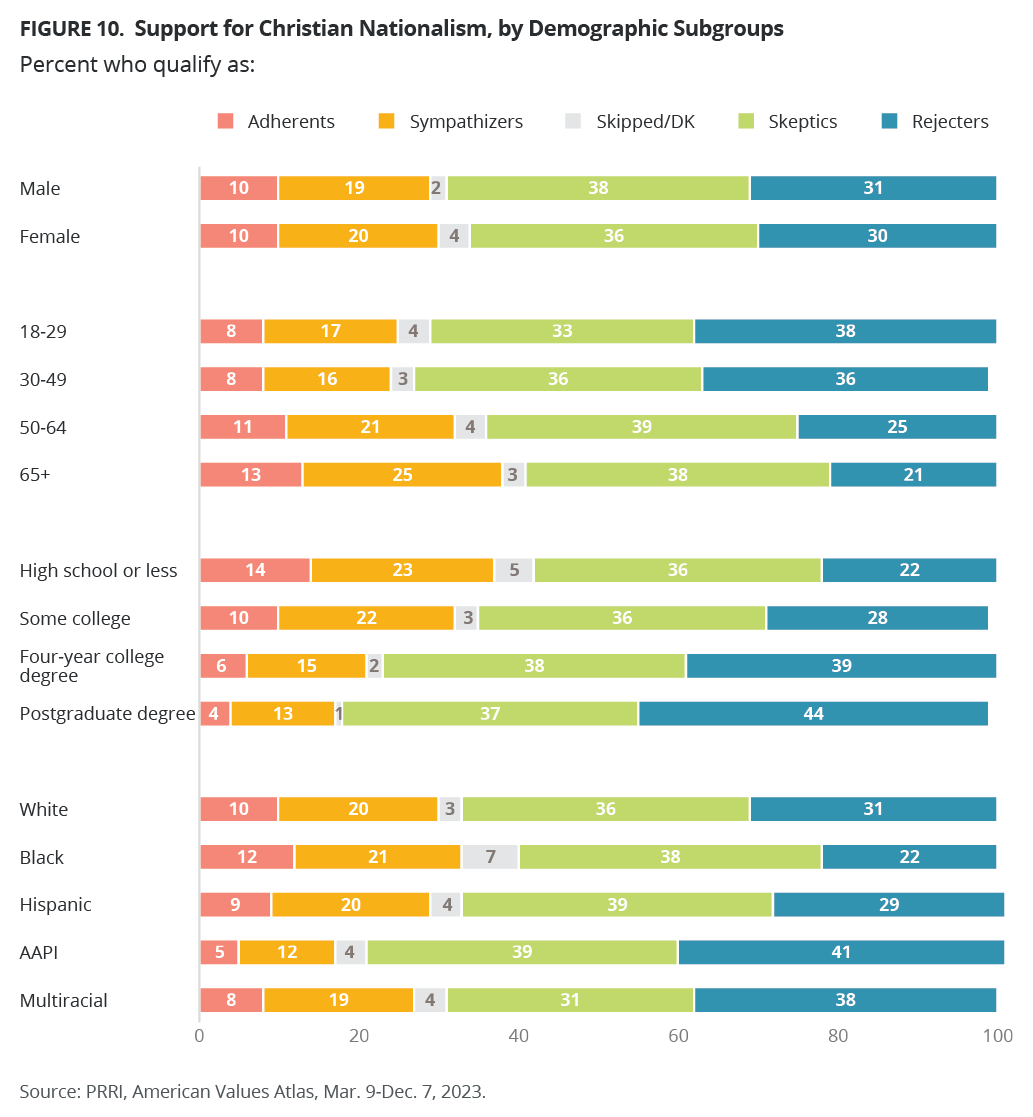
Which Religious Groups are Most Likely to be Christian Nationalists?
Religious Affiliation
Generally, religious groups that have been most closely aligned with the Republican Party are the most likely to hold Christian nationalist views. White evangelical Protestants are by far the most supportive of Christian nationalism. Two-thirds of white evangelical Protestants (66%) qualify as Christian nationalists (30% Adherents and 36% Sympathizers). A majority of Hispanic Protestants (55%) and 42% of Latter-day Saints also qualify as Christian nationalists.[5] The one exception to this partisan pattern is Black Protestants, among whom 39% qualify as either Christian nationalism Adherents or Sympathizers.
By contrast, the appeal of Christian nationalist ideology is significantly lower among other religious groups, including white mainline/non-evangelical Protestants (32%), white Catholics (31%), and Hispanic Catholics (25%). Only about one in ten members of other non-Christian religions (12%), Jewish Americans (8%), and the religiously unaffiliated (7%) qualify as Christian nationalists.[6]
Levels of support for Christian nationalism have remained relatively steady over the last year among almost all religious groups. Among Hispanic Protestants, however, support for Christian nationalism has grown 12 percentage points to 55%, up from 43% when PRRI first asked these questions in late 2022.
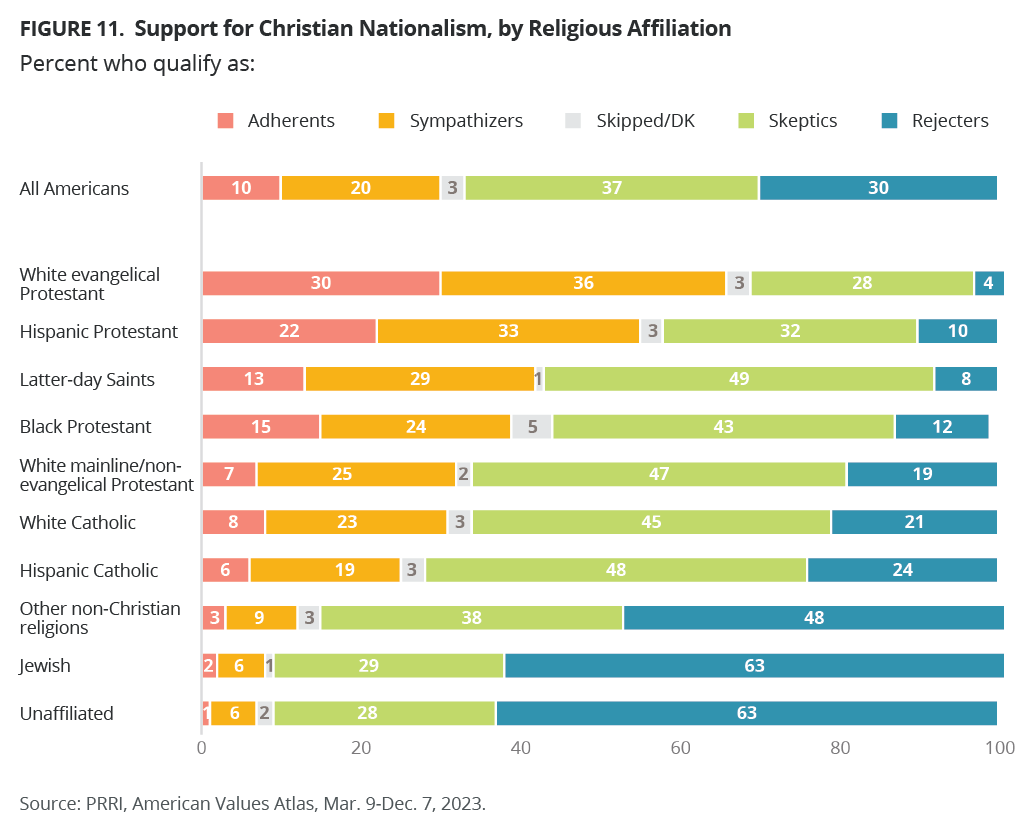
The Power of Evangelical or Born-Again Identity
Identifying as evangelical or born-again is positively correlated with holding Christian nationalist views. Among Americans overall who identify as an evangelical or born-again Christian, more than six in ten are Christian nationalism Sympathizers (35%) or Adherents (27%), compared with only three in ten of those who identify as Christian but not evangelical (28%). Across racial and ethnic lines, those who identify as born-again or evangelical are more than twice as likely as members of the same racial or ethnic groups who identify as Christian but not evangelical to be Christian nationalism Adherents or Sympathizers: white (67% vs. 30%), multiracial (61% vs. 24%), Hispanic (60% vs. 23%), AAPI (53% vs. 26%), and Black (51% vs. 21%).
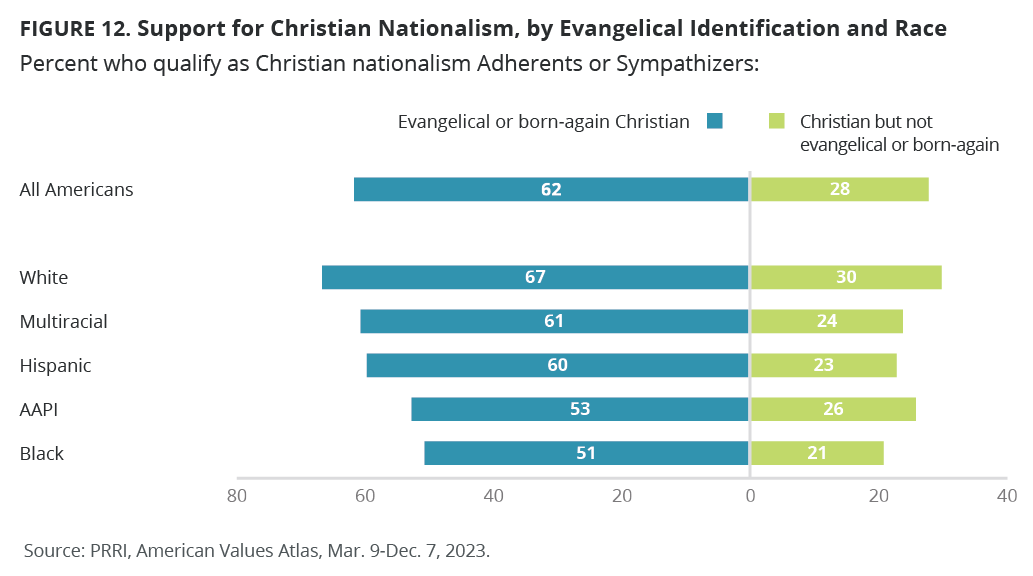
Religious Practices: Religious Attendance, Prayer, and Bible Reading
Americans who hold Christian nationalist views are not, as some have alleged, Christian in name only. For example, among the 15% of Americans who say religion is the most important thing in their lives, 63% are either Christian nationalist Adherents (31%) or Sympathizers (32%), compared with only 40% of those who say religion is just one among many important things in their lives (11% Adherents and 29% Sympathizers).
Americans who are most closely connected to churches and who engage frequently in traditional devotional practices such as prayer and Bible reading are also significantly more likely than less religiously engaged Americans to identify as Christian nationalist Adherents or Sympathizers:
- Among Americans who report reading the Bible weekly or more, 55% are Christian nationalist Adherents or Sympathizers, compared with 39% of those who report reading the Bible a few times a year and 17% of those who seldom or never read the Bible.
- Among Americans who attend religious services weekly or more, 52% are Christian nationalist Adherents or Sympathizers, compared with 38% of those who attend a few times a year and 18% of those who seldom or never attend.
- Among Americans who report praying weekly or more, 45% are Christian nationalist Adherents or Sympathizers, compared with 26% of those who report praying a few times a year and 10% of those who seldom or never pray.
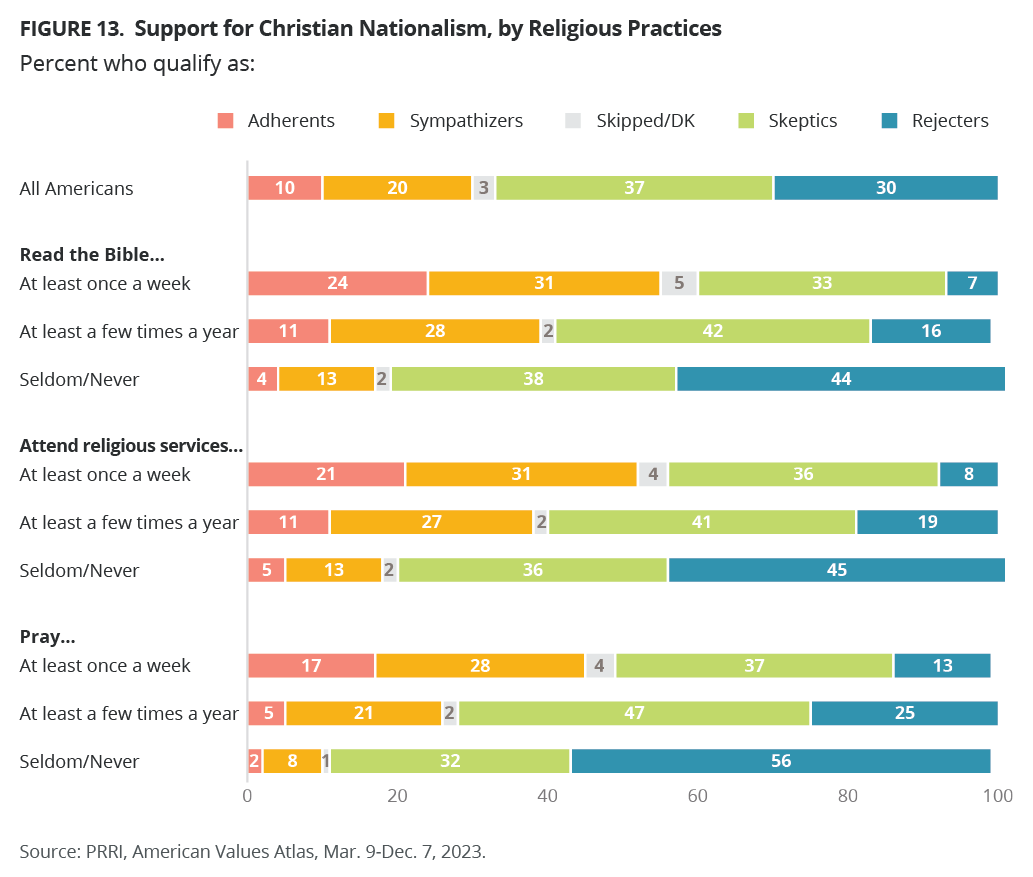
The Theological Worldview of Christian Nationalists: Prophecy, Healing, and the Prosperity Gospel
The religious worldview of Christian nationalism Adherents and Sympathizers sharply diverges from Skeptics and Rejecters with respect to theological beliefs that are markers of more charismatic strands of Christianity — specifically, beliefs about prophecy, healing, and the prosperity gospel.[7]
More than seven in ten Christian nationalism Adherents (79%) and Sympathizers (70%) agree that God reveals his plans for the future to humans as prophecy, compared with less than half of Skeptics (47%) and only 13% of Rejecters. Similarly, nearly seven in ten Adherents (69%) and a majority of Sympathizers (56%) agree that God has given some people the power to heal others through prayer and the “laying on of hands,” compared with only 37% of Skeptics and 10% of Rejecters. And a majority of Adherents (56%) and nearly half of Sympathizers (48%), compared with only 32% of Skeptics and 11% of Rejecters, affirm the core tenet of the prosperity gospel, the belief that God always rewards those who have faith with good health, financial success, and fulfilling personal relationships.
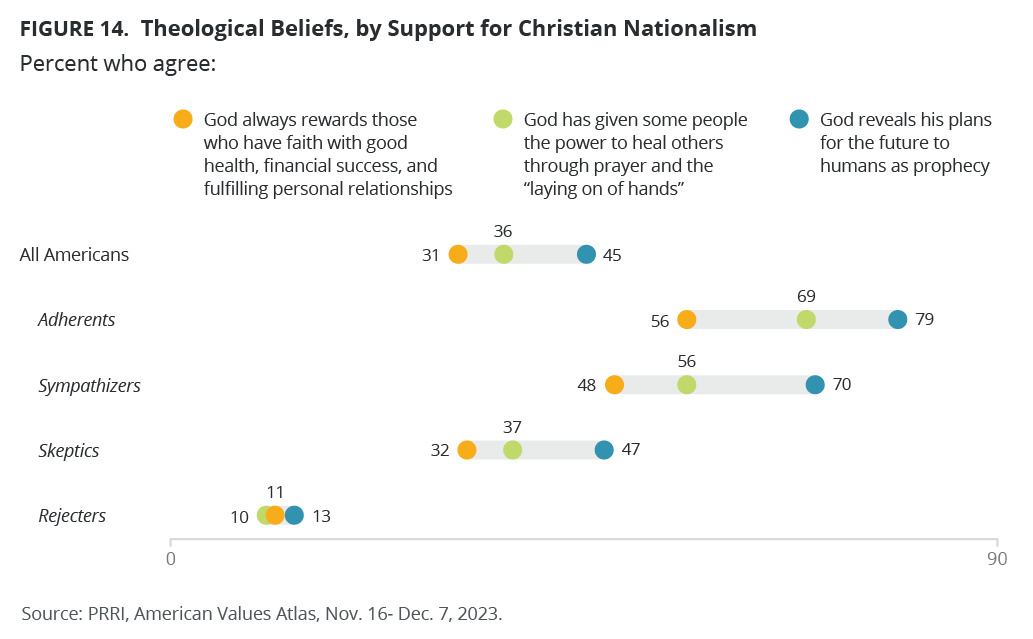
The Political Worldview of Christian Nationalists: Revolution and Political Violence
Christian nationalists are also more likely than other Americans to see political struggles through the apocalyptic lens of revolution and violence. Christian nationalism Adherents and Sympathizers are more than twice as likely as Skeptics and Rejecters to believe there is a storm coming soon that will sweep away the elites in power and restore the rightful leaders. A majority of Christian nationalism Adherents (54%) and 45% of Sympathizers agree with this statement, compared with only 22% of Skeptics and 7% of Rejecters. Agreement with this statement has risen 10 percentage points among Sympathizers since 2022, from 35% to 45%, but has remained stable among other groups.
Similarly, Christian nationalists are about twice as likely as other Americans to believe that political violence may be justified. Nearly four in ten Christian nationalism Adherents (38%) and one-third of Sympathizers (33%) agree that because things have gotten so far off track, true American patriots may have to resort to violence to save the country, compared with only 17% of Skeptics and 7% of Rejecters. Support for political violence among Christian nationalism Sympathizers has gone up by 11 percentage points since 2022, from 22% to 33%); it has remained steady among all other groups.
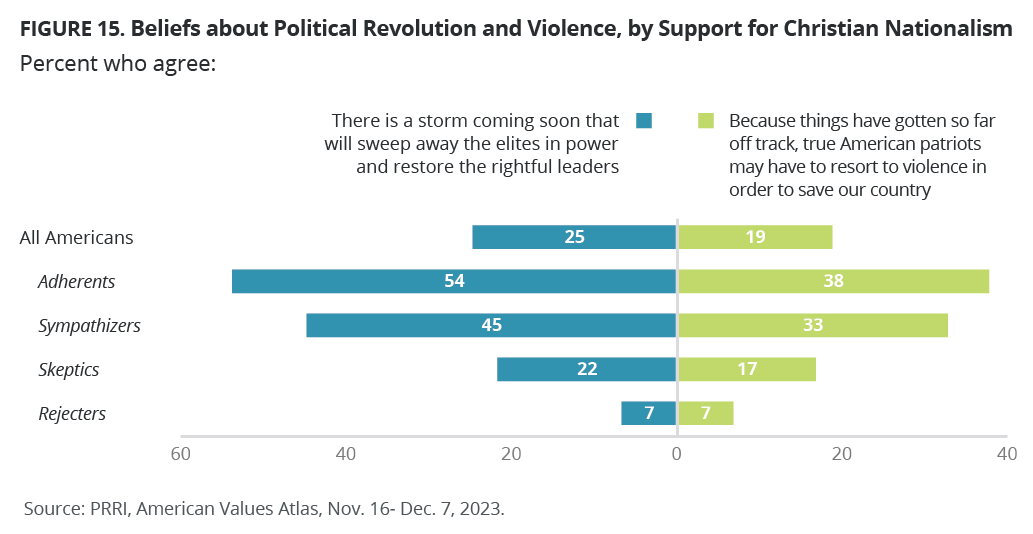
The Issue Priorities of Christian Nationalists
The survey contained a series of questions about whether five issues function as litmus test issues in voting: access to guns, immigration, abortion, LGBTQ issues, and climate change.
Overall, those who support Christian nationalist ideas are significantly more likely than other Americans to say that two issues are non-negotiable when considering support for a candidate: access to guns and immigration. Half of Christian nationalism Adherents (50%) say they would only vote for a candidate who shares their position on access to guns, compared with 39% of Sympathizers, 33% of Skeptics, and 39% of Rejecters. Similarly, nearly half of Adherents (49%) say they would only vote for a candidate who shares their views on immigration, compared with 39% of Sympathizers, 27% of Skeptics, 25% of Rejecters.
Christian nationalism Rejecters (40%) are more likely than all other Christian nationalism subgroups — Skeptics (21%), Sympathizers (20%), and Adherents (30%) — to say they would only support a candidate who agreed with them on climate change.
Reflecting the political polarization on abortion and LGBTQ rights, both Christian nationalism Adherents and Rejecters are roughly equally as likely to say that abortion (48% and 50% respectively) and LGBTQ rights (41% and 43%, respectively) are non-negotiable issues. Both are more likely than either Sympathizers (31%) or Skeptics (28%) to say abortion is a litmus test issue, but Sympathizers (27%) are more likely than Skeptics (21%) to say this about LGBTQ rights.
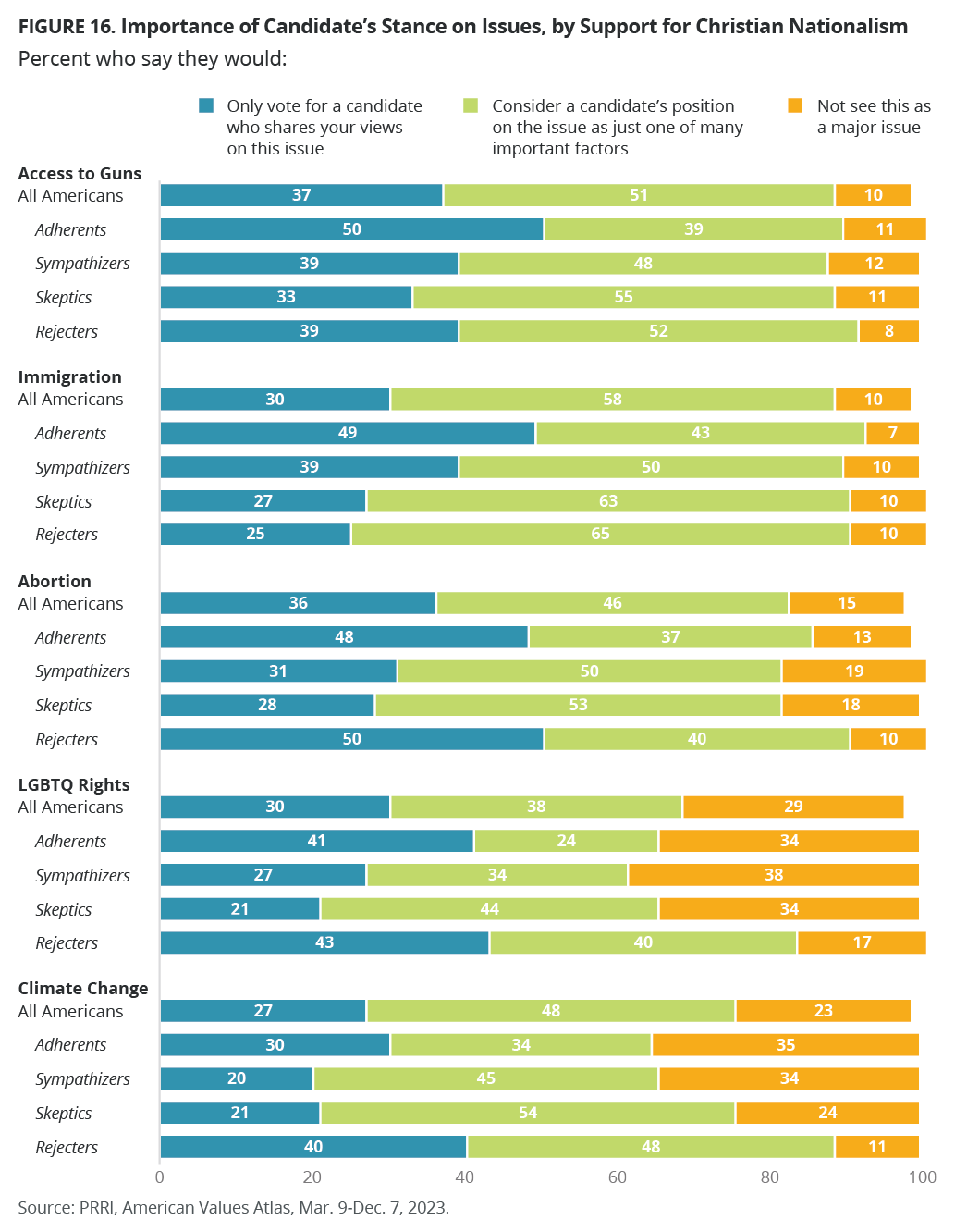
How Race and Ethnicity Impact the Political Orientations of Christian Nationalists
As noted above, white, Hispanic, and Black Americans are roughly equally as likely to hold Christian nationalist beliefs (defined as being either a Christian nationalist Adherent or Sympathizer). However, Christian nationalist beliefs are refracted through racial identity and carry importantly different political implications among white, Hispanic, and Black Americans.
Partisanship
Among white Americans and Hispanic Americans — but not Black Americans — holding Christian nationalist beliefs is strongly correlated with Republican Party identity. Nearly two-thirds of white Christian nationalists identify as Republican (64%), a rate twice as high as among Hispanic Christian nationalists (32%) and eight times as high as among Black Christian nationalists (8%). Among both white and Hispanic Americans, those who hold Christian nationalist beliefs are nearly twice as likely as white and Hispanic Americans overall to identify as Republican (whites: 64% vs. 34%; Hispanics: 32% vs. 17%). Notably, there is no such partisan association among Black Americans. Black Americans who hold Christian nationalist beliefs are not significantly more likely than Black Americans overall to identify as Republican (8% vs. 5%). In fact, in sharp contrast to white Christian nationalists, a majority of Black Christian nationalists (56%) identify with the Democratic Party.
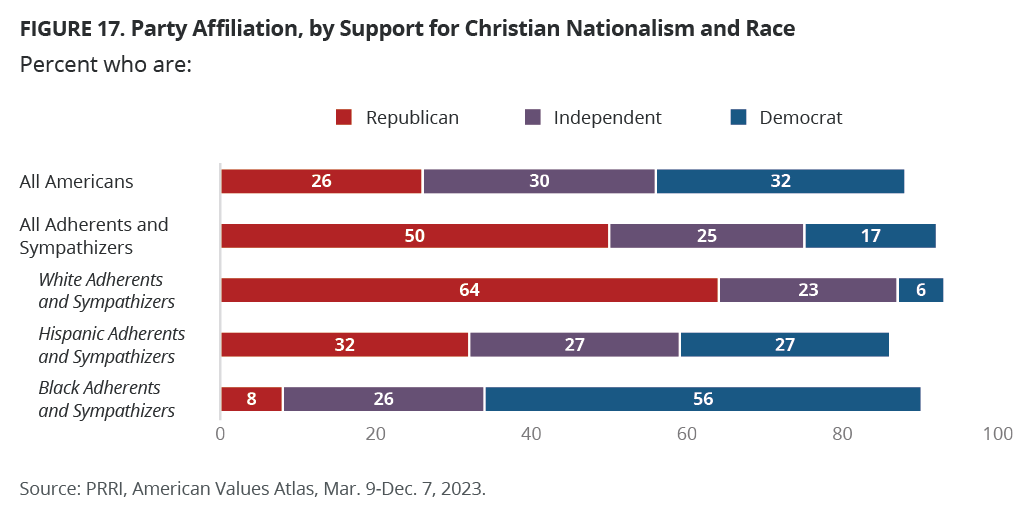
Favorability of Trump vs. Biden
Holding Christian nationalist beliefs is also more strongly correlated with holding favorable views of Trump among white and Hispanic Americans than among Black Americans. Nearly seven in ten white Christian nationalists (71%) and a majority of Hispanic Christian nationalists (51%) hold favorable views of Trump. By contrast, just one in five Black Christian nationalists (21%) view Trump favorably.
Among whites, those who hold Christian nationalist views are 33 percentage points more likely than whites overall to hold a favorable view of Trump (71% vs. 38%). Similarly, Hispanic Americans who hold Christian nationalist views are 20 percentage points more likely than Hispanic Americans overall to hold a favorable view of Trump (51% vs. 31%). The gap is much smaller among Black Americans, with Black Christian nationalists only slightly more likely than Black Americans overall to hold favorable views of Trump (21% vs. 14%).
Similar patterns hold with respect to feelings about Biden. While only 11% of white Christian nationalists and 33% of Hispanic Christian nationalists hold favorable views of Biden, more than six in ten Black Christian nationalists (62%) say they have a favorable view of Biden.
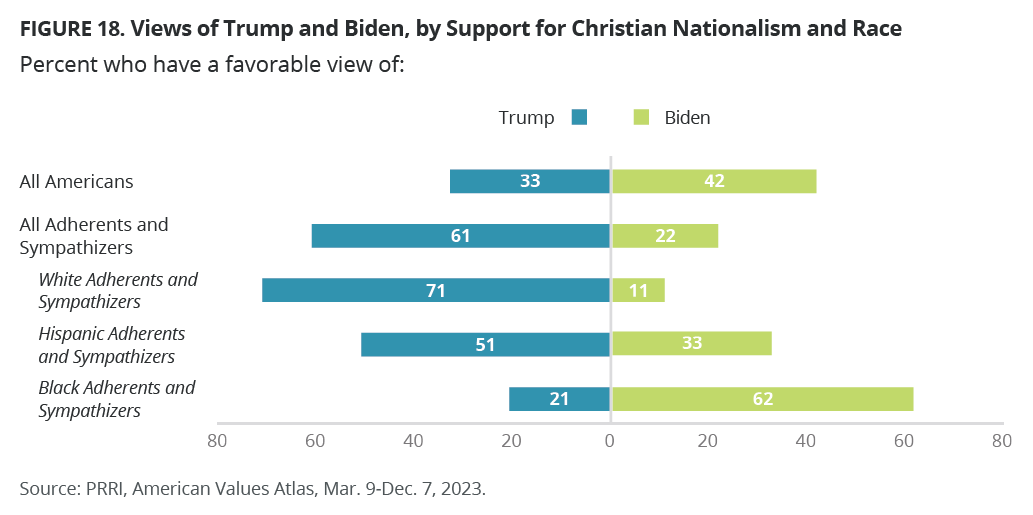
Issue Priorities
White Christian nationalists are the most concerned with immigration and access to guns when they think about supporting a political candidate. Nearly half of white Christian nationalists (46%), compared with 39% of Hispanic Christian nationalists and only 29% of Black Christian nationalists, say they would only vote for a candidate who agreed with their stance on immigration. Similarly, nearly half of white Christian nationalists (46%) say they would only vote for a candidate who shares their views on access to guns, compared with 39% of Hispanic Christian nationalists and 32% of Black Christian nationalists. Differences among other issues measured — abortion, LGBTQ rights, and climate change — were more muted, and no Christian nationalist racial group registered more than 40% saying any of these were litmus test voting issues.
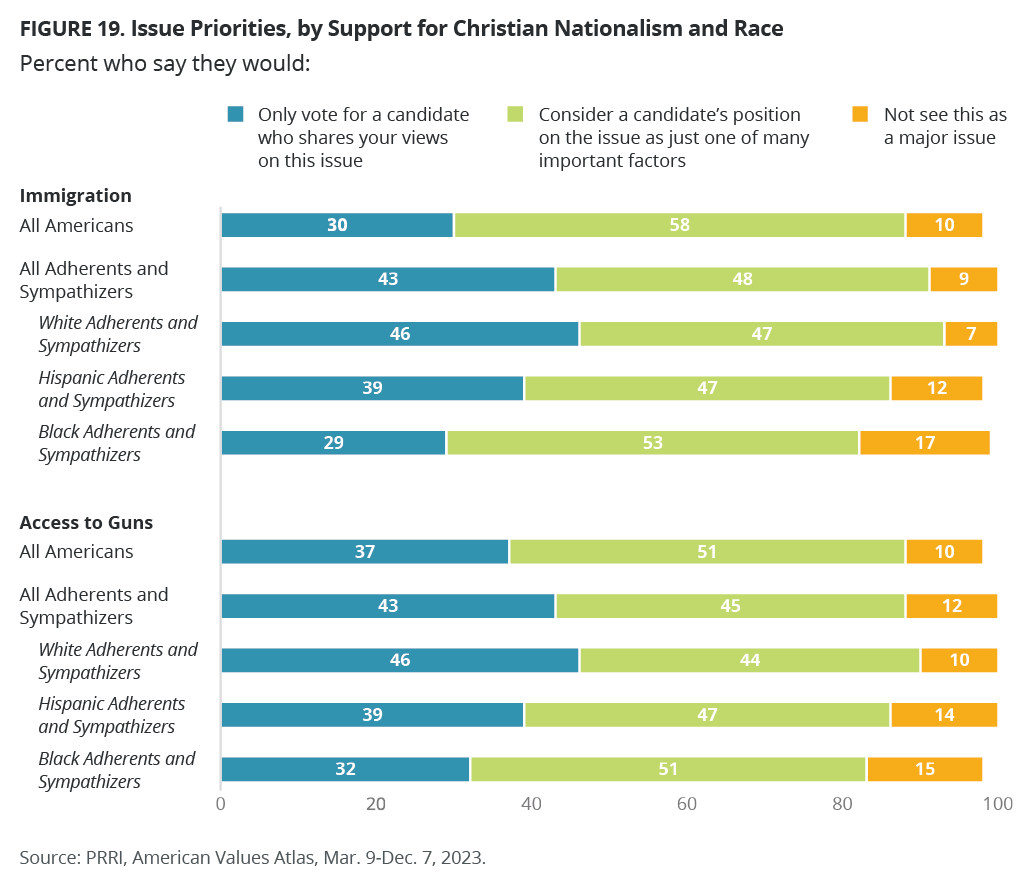
Political Revolution and Violence
Christian nationalists are significantly more likely than Americans overall to believe both that a political revolution is coming soon to restore rightful leaders to power and that political violence may be necessary to save the country. Among Christian nationalists, these views are generally shared across racial lines, although Black Christian nationalists are the least likely to support political violence.
Roughly half of Black (53%), Hispanic (52%), and white (46%) Christian nationalists believe a storm is coming soon that will replace the elites currently in power with the rightful leaders. On the question of political violence, Hispanic Christian nationalists (39%) are the most likely to agree that true American patriots may have to resort to violence to save the country, followed by one-third of white Christian nationalists (33%) and 28% of Black Christian nationalists.
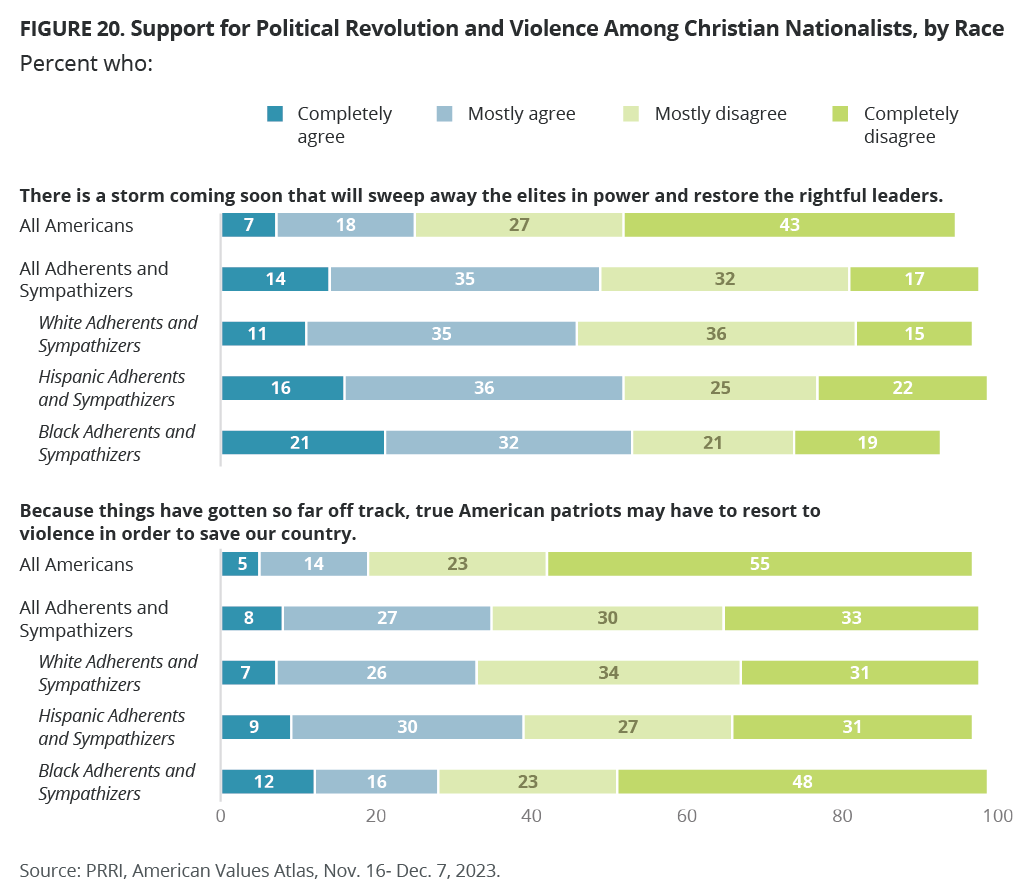
Trusted Media Sources
White Christian nationalists (21%) are notably more likely than Hispanic (16%) and Black Christian nationalists (7%) to most trust Fox News to give them accurate information about current events and politics. While white Christian nationalists (13%) are slightly more likely than Hispanic Christian nationalists (9%) to most trust far-right news sources such as One America News Network and Newsmax, they are about seven times as likely as Black Christian nationalists (2%) to do so. By contrast, two-thirds of Black Christian nationalists (68%) most trust mainstream media sources, compared with 35% of Hispanic Christian nationalists and 28% of white Christian nationalists. Black Christian nationalists (20%) are also the least likely to say they do not watch any TV news sources, compared with about one-third of Hispanic Christian nationalists (34%) and white Christian nationalists (32%).
What Factors Predict Christian Nationalist Beliefs among White, Hispanic, and Black Americans?
To further understand the appeal of Christian nationalism among different racial and ethnic groups, we conducted a separate multivariate regression analysis for white, Hispanic, and Black Americans (See Appendix C for full regression model output). The regression models control for a range of political and socioeconomic characteristics, such as education, age, gender, partisanship, born-again/evangelical Christian identification, religious attendance, and charismatic/prosperity gospel beliefs. As the analysis below demonstrates, the factors predicting support for holding Christian nationalist views differ in important ways across racial and ethnic groups.
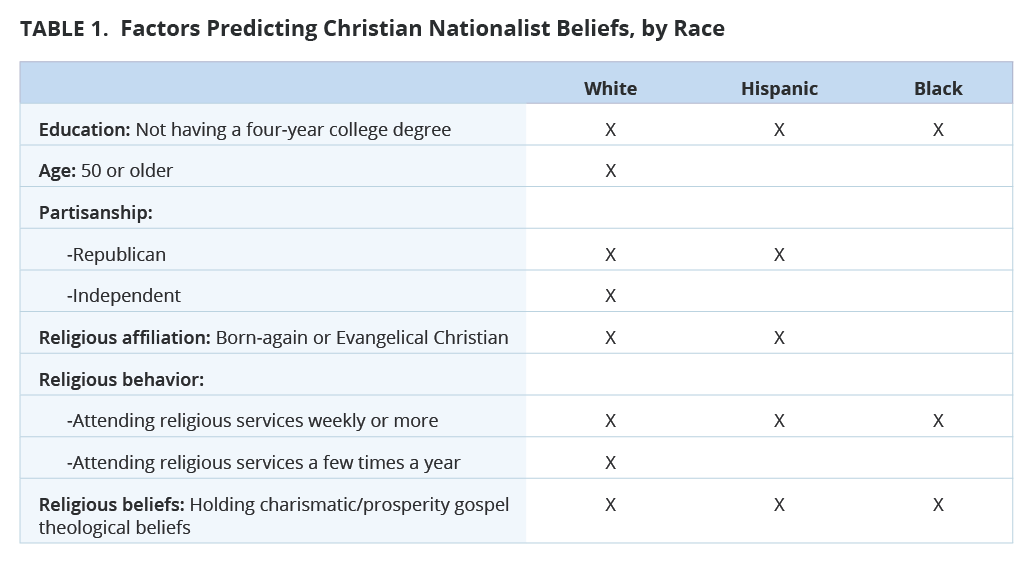 Among white Americans, eight separate factors are independently predictive of holding Christian nationalist views:
Among white Americans, eight separate factors are independently predictive of holding Christian nationalist views:
- Education: Not having a four-year college degree
- Age: Being 50 or older
- Partisanship:
- Identifying as Republican
- Identifying as independent
- Religious affiliation: Identifying as an evangelical or born-again Christian
- Religious behavior:
- Attending religious services weekly or more
- Attending religious services a few times per year
- Religious beliefs: Holding charismatic/prosperity gospel theological beliefs
Among Hispanic Americans, five factors are independently predictive of holding Christian nationalist views:
- Education: Not having a four-year college degree
- Partisanship: Identifying as Republican
- Religious affiliation: Identifying as an evangelical or born-again Christian
- Religious behavior: Attending religious services weekly or more
- Religious beliefs: Holding charismatic/prosperity gospel theological beliefs
In contrast to white Americans, being older, identifying as independent, and attending religious services a few times per year are not significant predictors of Christian nationalist views among Hispanic Americans.
Among Black Americans, holding Christian nationalist views is independently linked to just three factors:
- Education: Not having a four-year college degree
- Religious behavior: Attending religious services weekly or more
- Religious beliefs: Holding charismatic/prosperity gospel theological beliefs
In contrast to both white and Hispanic Americans, identifying as Republican and identifying as a born-again or evangelical Christian are not significant predictors of Christian nationalist views among Black Americans. These multivariate models help us make sense of the earlier findings showing that Black Christian nationalists retain connections to the Democratic Party and have more favorable views of Biden than either Hispanic or white Christian nationalists.
APPENDIX A. Methodology for the Christian Nationalism Scale
The Christian nationalism scale replicates the methodology developed in the PRRI/Brookings Christian Nationalism Survey (fielded November – December 2022). The Christian nationalism scale combines answers to the following five questions using an additive scale and recalibrates the scores to values from 0 (low) to 1 (high). Respondents’ answers across all five questions are highly correlated, with a Cronbach’s alpha of 0.93, indicating a high degree of reliability for the scale.
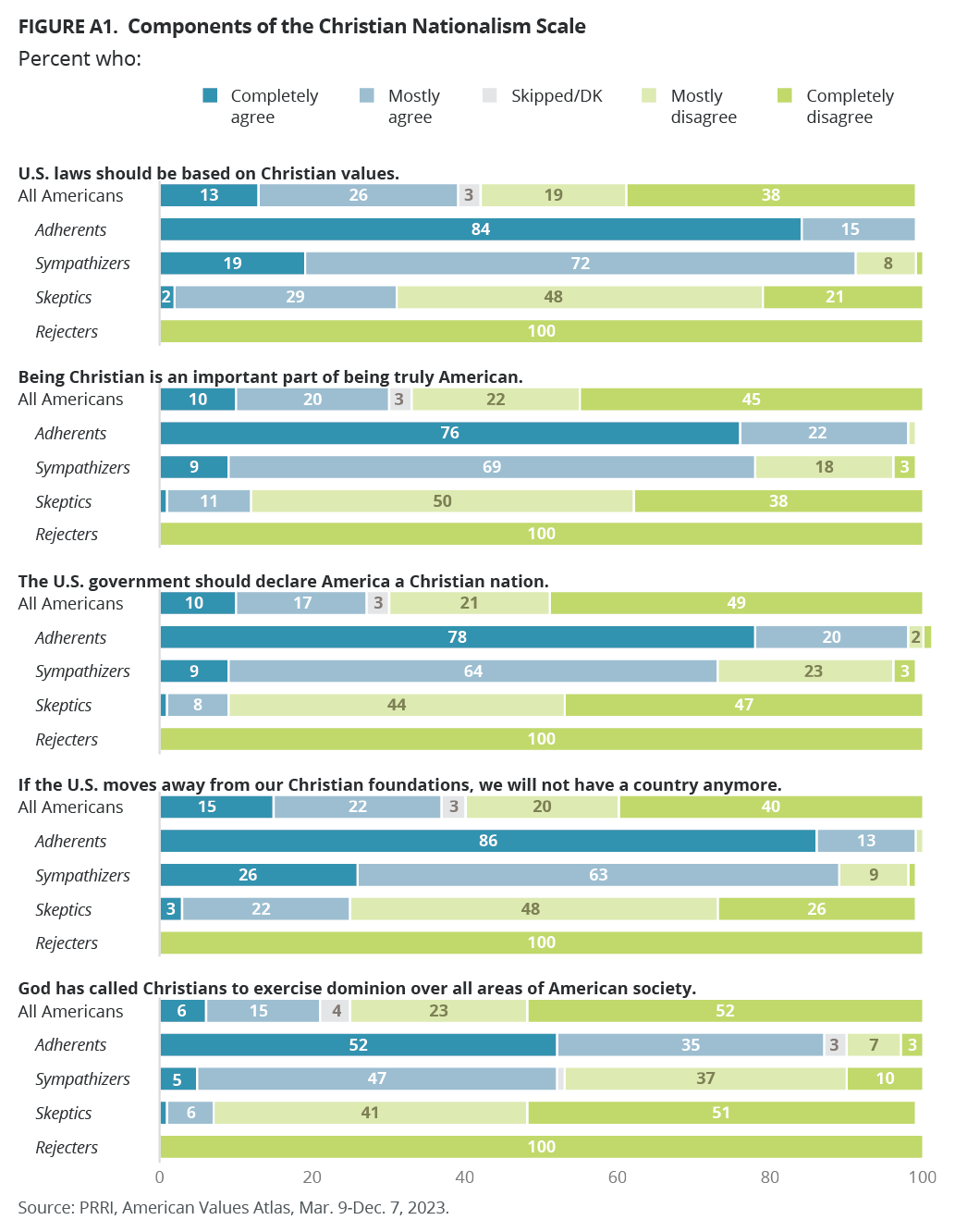
APPENDIX B. Support for Christian Nationalism by State, Coded by Projected Red, Blue, and Battleground States in the 2024 Election
The following table is sorted in descending order by the proportion of residents in each state who identify as Christian nationalism Adherents or Sympathizers. Additionally, rows are coded red for safe Republican states, blue for safe Democratic states, and tan for battleground states. As the pattern demonstrates, the proportion of Christian nationalism Adherents and Sympathizers in each state is strongly correlated with the state’s partisan tilt.
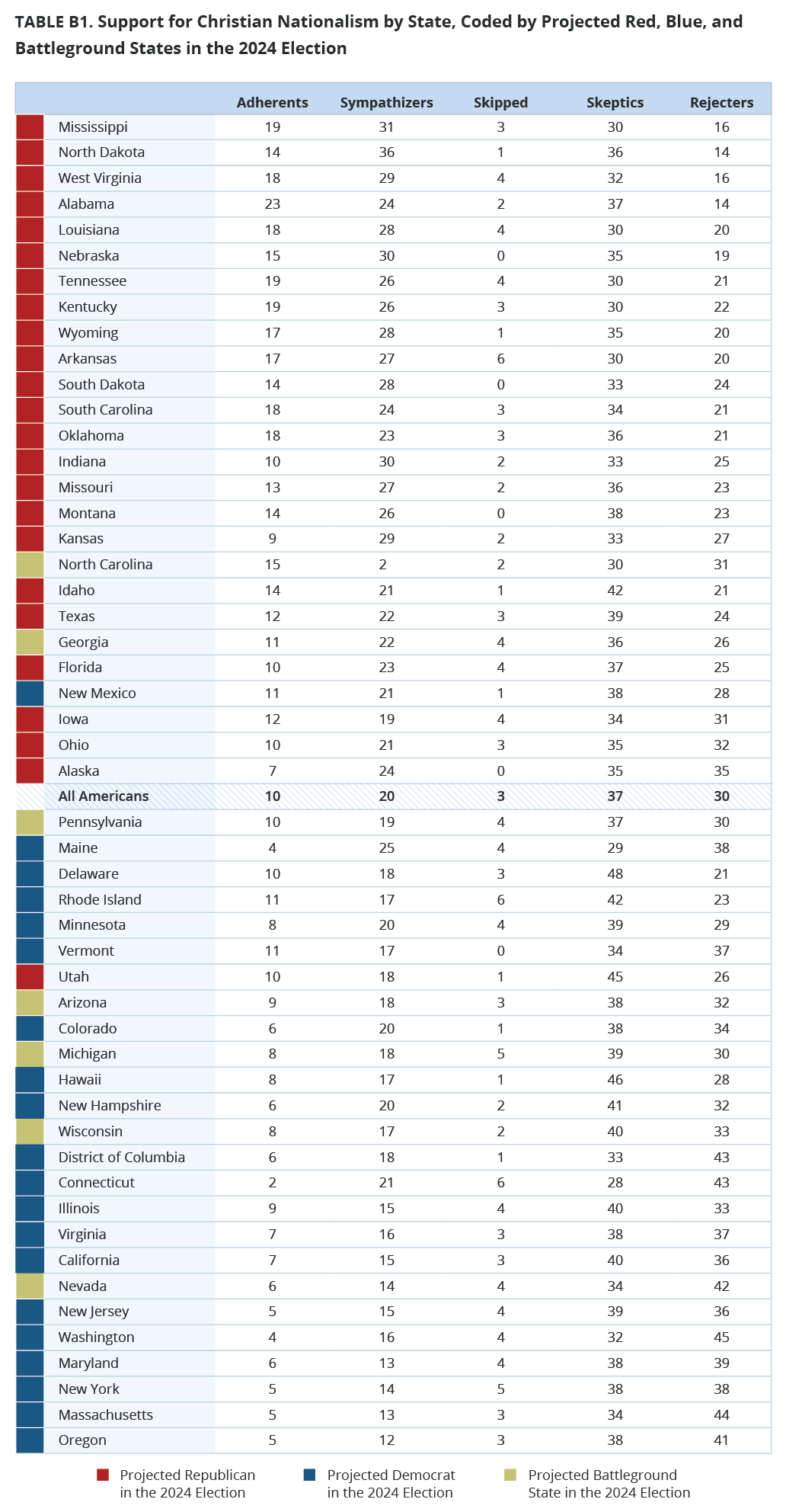
APPENDIX C. Regression Model Output Predicting Christian Nationalism Adherence among White, Hispanic, and Black Americans
In the regression model below, the dependent variable has four categories arranged in sequential order, where a value of 1 refers to Rejecters, a value of 2 to Skeptics, a value of 3 to Sympathizers, and a value of 4 to Adherents. Due to the ordinal nature of the dependent variable, we employed an ordered logistic regression model.
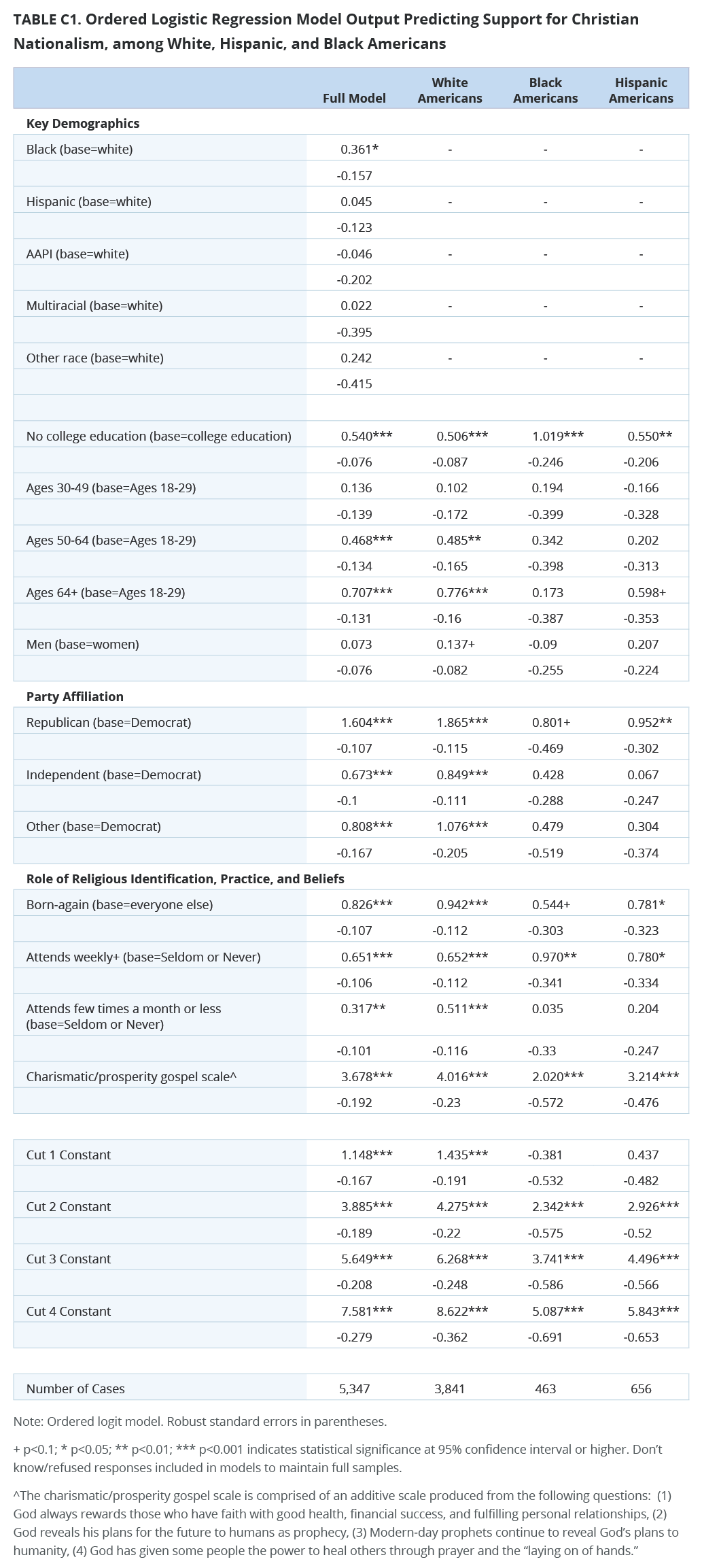
Survey Methodology
The survey was designed and conducted by PRRI. The survey was made possible through the generous support of the Carnegie Corporation of New York, the Foundation to Promote Open Society, the Wilbur & Hilda Glenn Family Foundation, and the Unitarian Universalist Veatch Program at Shelter Rock. The survey was carried out among a random representative sample of 22,465 adults (age 18 and up) living in all 50 states in the United States. Among those, 20,799 are part of Ipsos’s Knowledge Panel and an additional 1,666 were recruited by Ipsos using opt-in survey panels to increase the sample sizes in smaller states. Interviews were conducted online between March 9 and December 7, 2023.
Respondents are recruited to the KnowledgePanel using an addressed-based sampling methodology from the Delivery Sequence File of the USPS – a database with full coverage of all delivery addresses in the U.S. As such, it covers all households regardless of their phone status, providing a representative online sample. Unlike opt-in panels, households are not permitted to “self-select” into the panel; and are generally limited to how many surveys they can take within a given time period.
The initial sample drawn from the KnowledgePanel was adjusted using pre-stratification weights so that it approximates the adult U.S. population defined by the 2022 March Supplement of the Current Population Survey (CPS), except language proficiency , which is not available from CPS, were obtained from the 2021 American Community Survey (ACS). Next, a probability proportional to size (PPS) sampling scheme was used to select a representative sample.
To reduce the effects of any non-response bias, a post-stratification adjustment was applied based on demographic distributions from the CPS. The post-stratification weight rebalanced the sample based on the following benchmarks: age, race and ethnicity, gender, Census division, metro area, education, and income. The sample weighting was accomplished using an iterative proportional fitting (IFP) process that simultaneously balances the distributions of all variables. Weights were trimmed to prevent individual interviews from having too much influence on the final results. In addition to an overall national weight, separate weights were computed for each state to ensure that the demographic characteristics of the sample closely approximate the demographic characteristics of the target populations. The state-level post-stratification weights rebalanced the sample based on the following benchmarks: age, race and ethnicity, gender, education, and income.
These weights from the KnowledgePanel cases were then used as the benchmarks for the additional opt-in sample in a process called “calibration.” This calibration process is used to correct for inherent biases associated with nonprobability opt-in panels. The calibration methodology aims to realign respondents from nonprobability samples with respect to a multidimensional set of measures to improve their representation.
The margin of error for the national survey is +/- 0.82 percentage points at the 95% level of confidence, including the design effect for the survey of 1.56. In addition to sampling error, surveys may also be subject to error or bias due to question wording, context, and order effects. Additional details about the KnowledgePanel can be found on the Ipsos website: ipsos.com/en-us/solution/knowledgepanel
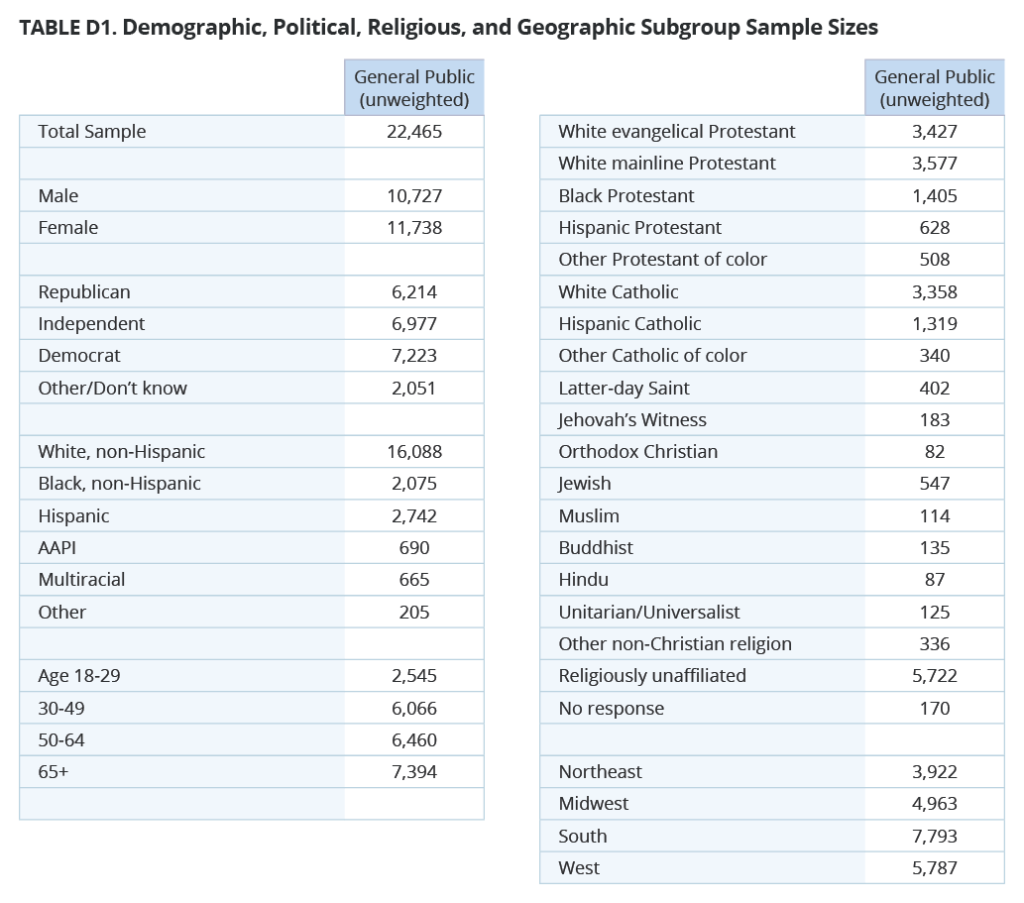
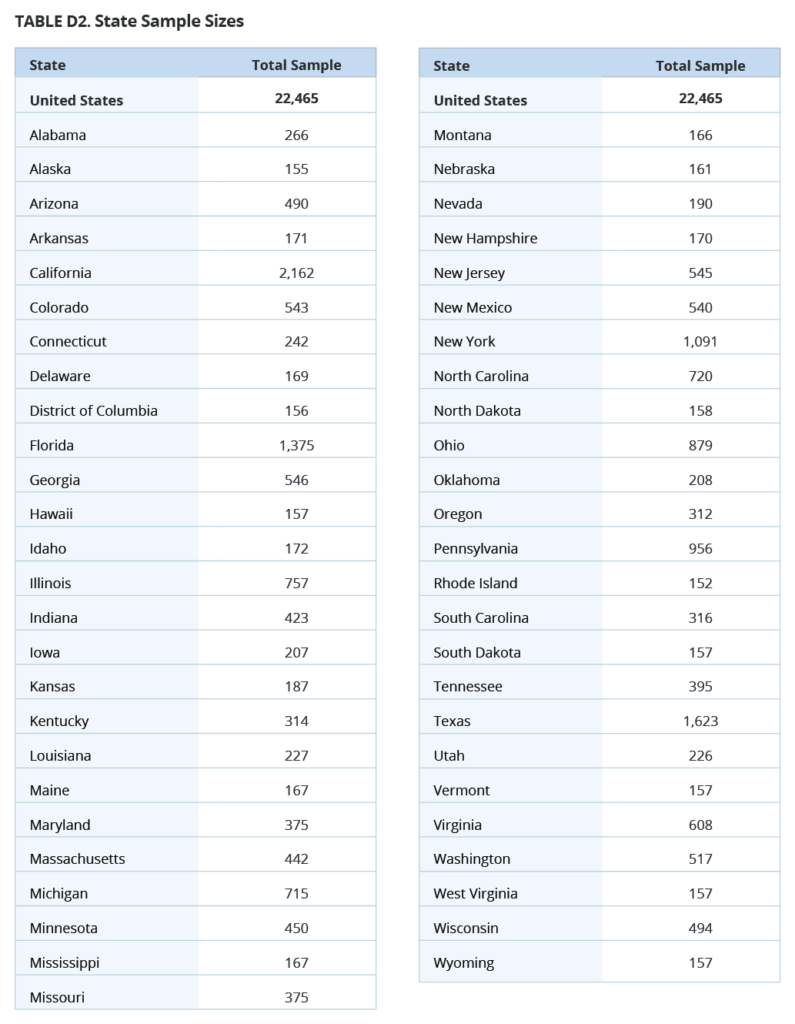
[1] In most states, the survey did not have a large enough sample size to estimate the proportion of non-white residents who are Christian nationalist Adherents or Sympathizers. Among the states with large enough sample sizes, only one, Louisiana (45%), registered more than four in ten non-white Americans supportive of Christian nationalism.
[2] 2020 voter data was retrieved from AP VoteCast Election 2020 public use data file (for details, see: https://apnorc.org/wp-content/uploads/2021/05/AP_VoteCast_2020_methodology.pdf).
[3] Vote among whites is not available for Hawaii (HI), North Dakota (ND), Rhode Island (RI), South Dakota (SD), Vermont (VT), and Wyoming (WY). Voter data for whites only for Montana (MT) was retrieved from CNN exit polls: https://www.cnn.com/election/2020/exit-polls/president/montana/5
[4] Mainstream news outlets include local broadcast news, national broadcast networks (NBC, CBS, and ABC), CNN, MSNBC, and PBS.
[5] Additionally, nearly half (48%) of “other Protestants of color” hold Christian nationalist views. This diverse and small group (only 2% of Americans) consists mostly of Asian American and Pacific Islanders (AAPI) and mixed-race Protestants who tend to lean Republican. Sample sizes are too small to analyze these groups individually.
[6] Other non-Christians include Americans who identify as Muslim, Buddhist, Hindu, Unitarian Universalist, or any other non-Christian, non-Jewish affiliation. Sample sizes are too small to analyze these groups individually.
[7] These questions were asked only in wave 4 (N=5,627) of the PRRI American Values Atlas survey, conducted from Nov. 16–Dec. 7, 2023. The prosperity gospel is a set of theological beliefs asserting that God grants the faithful with good health and, especially, financial success and wealth. Historically, many Christian denominations have denounced this theology, though many non-denominational mega-churches and television ministries have espoused such views. Many of Trump’s closest evangelical advisors, such as Paula White, can be described as proponents of the prosperity gospel.


